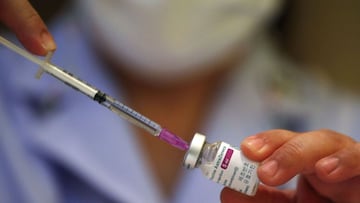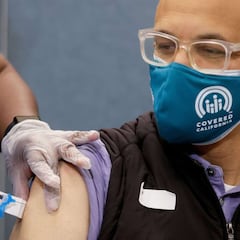Why has the AstraZeneca vaccine been canceled in some European countries?
Several nations have followed Denmark, Norway and Iceland by suspending AstraZeneca vaccine roll-out after reports of blood clotting in some recipients.

Confidence in the global roll-out of the AstraZeneca covid-19 vaccine has been rocked after health authorities in Denmark, Norway and Iceland on Thursday suspended the use of shots following reports of the formation of blood clots in some people who had been vaccinated with doses traced to a batch of one million vaccines distributed to 17 European Union countries.
Austria earlier stopped using a batch of AstraZeneca shots while investigating a death from coagulation disorders and an illness from a pulmonary embolism.
Still, the European medicine regulator EMA said the vaccine's benefits outweighed its risks and could continue to be administered. Europe is struggling to speed up a vaccine rollout after delivery delays from Pfizer and AstraZeneca, even as a spike in cases amid a more contagious virus variant has triggered fresh lockdowns in countries like Italy and France.
Denmark halts AstraZeneca over "possible serious side effects"
The European Medicines Agency has said there is no indication that the Oxford/AstraZeneca vaccine caused blood clots, with 30 cases reported among 5 million people who have had the jab in Europe. Some countries have paused use of the vaccine. https://t.co/1gSg4OvTu9
— New Scientist (@newscientist) March 12, 2021
Denmark suspended the shots for two weeks after a 60-year-old woman, who was given an AstraZeneca shot from the same batch used in Austria, formed a blood clot and died, Danish health authorities said. Their response was also prompted by reports "of possible serious side effects" from other European countries.
"It is currently not possible to conclude whether there is a link. We are acting early, it needs to be thoroughly investigated," Health Minister Magnus Heunicke said on Twitter.
"This is a cautionary decision," Geir Bukholm, director of infection prevention and control at the Norwegian Institute of Public Health (FHI), told a news conference. FHI did not say how long the suspension would last. "We ... await information to see if there is a link between the vaccination and this case with a blood clot," Bukholm said.
Iceland on Thursday suspended jabs with the vaccine as it awaited the results of an investigation by the EMA. Italy, also on Thursday, said it would suspend use of an AstraZeneca batch different to the one used in Austria.
Health experts back AstraZeneca vaccine
Europe’s problems with the AstraZeneca Covid-19 vaccine deepens, with at least nine countries suspending it over safety concerns that Germany and France say are unfounded https://t.co/T27GBUDAq1
— Bloomberg (@business) March 12, 2021
Some health experts said there was little evidence to suggest the AstraZeneca vaccine should not be administered and that the cases of blood clots corresponded with the rate of such cases in the general population.
"The problem with spontaneous reports of suspected adverse reactions to a vaccine are the enormous difficulty of distinguishing a causal effect from a coincidence," Stephen Evans, professor of pharmacoepidemiology at the London School of Hygiene & Tropical Medicine, told Reuters.
Evans added that the covid-19 disease was very strongly associated with blood clotting.
Phil Bryan, head of the UK Medicines and Healthcare Products Regulatory Agency (MHRA) said reports of blood clots so far didn't exceed what would have occurred naturally in the vaccinated population. "Available evidence does not confirm that the vaccine is the cause," he said.
More than 11 million doses of AstraZeneca's vaccine have so far been administered across the UK.
AstraZeneca told Reuters in a written statement the safety of its vaccine had been extensively studied in human trials and peer-reviewed data confirmed it was generally well tolerated. The drugmaker said this week there had been "no confirmed serious adverse events associated with the vaccine". It said it was in contact with Austrian authorities and would fully support their investigation.
The European Union's drug regulator, the EMA, said on Wednesday there was no evidence so far linking AstraZeneca to the two cases in Austria.
It said the number of thromboembolic events - marked by the formation of blood clots - in people who have received the AstraZeneca vaccine was no higher than that seen in the general population, with 22 cases reported among the 3 million people who have received the shot as of March 9.
EMA said it understood the decision by Denmark and Norway was taken as a precaution. Four other countries - Estonia, Lithuania, Luxembourg and Latvia - have stopped inoculations from the batch while investigations continue, the EMA said.
World reaction to AstraZeneca vaccine scare
First delivery of 24,000 #AstraZeneca #COVID19 vaccines arrived in Cabo Verde🇨🇻 last night thanks to #COVAX. Another delivery of #Pfizer vaccines is expected next week.
— WHO African Region (@WHOAFRO) March 12, 2021
Cabo Verde will begin vaccinating healthcare workers on 19th March! pic.twitter.com/C1c3AOKIFA
Thailand announced on Friday that it would delay its AstraZeneca vaccine program after developments in Europe. “The administration of vaccines among Thais has to be safe. We are not in a position where we need to rush things,” Piyasakol Sakolsatayadorn, the head of the government’s vaccination committee, said in a press conference.
Bulgaria has also halted inoculations with the AstraZeneca vaccine until the EMA sends a written statement dispelling all doubts about the vaccine's safety, the government said in a statement. Romania on Thursday also temporarily halted the roll-out of 4,000 doses from the batch withdrawn by Italy.
French vaccination chief Alain Fischer said on Friday the AstraZeneca vaccine had shown great efficacy, reaffirming France's commitment to an inoculation which has been suspended in several other countries.
Speaking on Radio Classique, he also welcomed the approval by European Union health authorities of the COVID vaccine developed by Johnson & Johnson, saying it would not be available in France before next month.
French Health Minister Olivier Veran said the French drug safety agency, in line with its European Union counterpart, had advised that there was no reason to suspend injections with the AstraZeneca vaccine. "The benefits of the AstraZeneca vaccine are considered higher than the risks at this point," Veran said at the government's weekly coronavirus briefing.
He said investigations were continuing in France and abroad and added that Britain - which has vaccinated millions with the AstraZeneca shot - advised continuing with it and had not noted large-scale excess risk related to the vaccine.
Mexico's deputy health minister Hugo Lopez-Gatell said on Thursday that Mexico will continue applying doses of AstraZeneca vaccine while Canada said there is no indication that the vaccine causes adverse effects such as blood clotting.
"At this time, there is no indication that the vaccine caused these events," Canada's health department said in a statement. The statement added that none of the batches of the vaccine that were the focus of investigation in Europe had been delivered to Canada.
Related stories
Philippine health authorities said on Friday they saw no reason to halt using the AstraZeneca vaccine. "At present, the Department of Health and the Food and Drug Administration emphasize that there is no indication for the Philippines to stop rollout of AstraZeneca vaccines," the health ministry and the country's food and drug administration said in a joint statement, adding that benefits outweigh the risks.
The Philippines has so far received 525,600 doses of AstraZeneca's covid-19 vaccine through the COVAX facility.
- AstraZeneca
- Denmark
- Norway
- Iceland
- Public health system
- Science
- Coronavirus Covid-19
- Scandinavia
- Pharmaceutical industry
- Vaccines
- Pandemic
- Coronavirus
- Pharmacy
- Infectious diseases
- Virology
- Outbreak
- Vaccination
- Health system
- Diseases
- Microbiology
- Preventive medicine
- Medicine
- Europe
- Enterprises
- Health service
- Health
- Industry
- Life sciences
- Biology

